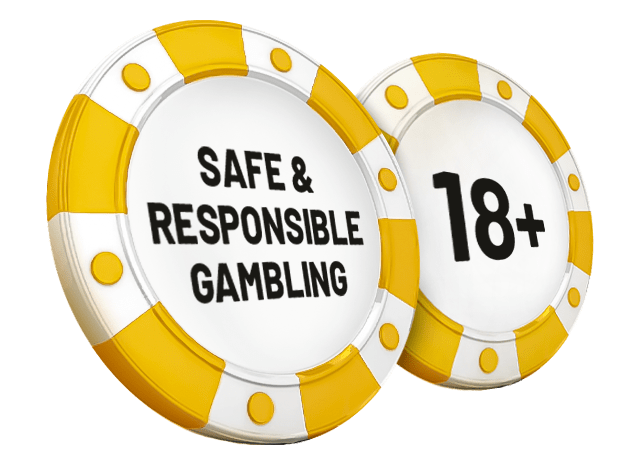
New Jersey Responsible Gambling | Know If You Play Safe
Online gambling is a perfect pastime to have fun and win real money. Nonetheless, when some players chase losses, they start borrowing funds to increase bets and winnings. As a result, they are getting gambling addiction, and online casino responsible gambling is a way to prevent it.

What Is Responsible Gambling?
By setting responsible gambling policy, New Jersey online casinos, game providers, and regulatory authorities prevent the growth of problem gamblers. They guarantee secure casino play, improve player awareness, informing about possible risks, and provide users with referrals to treatment.

Find Out If You Have a Gambling Addiction
To recognize if you have a gambling addiction or not, it will be helpful to answer the several questions below:
- Do you have any worries that might indicate a potential gambling problem?
- Have there been unsuccessful attempts in the past to try and stop gambling altogether?
- Do you play longer than planned, even though you intend to quit?
- Is increasing bets necessary for you to feel satisfied while gambling?
- Are you being dishonest with yourself or others about the time and money spent while gambling?
- Do you struggle to stop playing when losing?
- Is your ability to perform at work or school impaired by your gambling habits?
- Does the hardship (financial, emotional, or otherwise) caused by your gambling affect your family?
- Have you spent more money on gambling than you initially budgeted?
The more positive answers, the higher the risk of gambling addiction. Never gamble if you know you cannot stop.

Age for Gambling In New Jersey
Confirmed age is one of the measures to control online casino responsible play. According to gambling laws in New Jersey state, the legal age to gamble is 21. A person’s identification during registration is a vital procedure at the casino; by asking for the four last numbers of your SSN, the casino will confirm your identity.

Red Signs of Problem Gamblers

There are several red signs which highlight problem gamblers, among others:
- Borrowing money for increasing bets and getting a thrill.
- Chasing losses.
- Selling the property to fund your balance.
- Obsession with gambling.
- Gambling lying, and hiding the fact you play.
- Underperformance at work or studies, etc.
If you see that you have much in common, don’t wait until it’s too late. Instead, check available resources that will help if you have a gambling problem.
How Can You Control Your Gambling?
Thanks to online casino responsible gambling policies, you can control your gambling through:
- Casino deposit limit.
- Loss limit.
- Session limit.
- Time out.
- Wagering limit.
- Transaction history.
- Self-exclusion & self-assessment.
- Timer usage.
To gain a better understanding of how it can be handy, let’s take each point a little closer.


Casino Deposit Limit
You are able to control your budget setting the amount you are ready to lose per day, week, or month. This way, you will know the allowed fund to deposit.
Loss Limit
Once you reach a certain loss limit, most casinos will either refuse your funds or lock your account so you can no longer play. It is an excellent way to prevent chasing losses and make sure you don’t get too deep into gambling.
Session Limit
Setting a time limit for your gambling sessions is a great way to ensure you stay in control and don’t over-extend yourself. It can help prevent costly mistakes while allowing you to be more mindful of your play. You will have enough time to regain perspective and rethink strategies.
Time Out
If you have been playing a gambling session for a long time and cannot stop, it’s better to rest and exclude gambling for some period.
Wagering Limit
Establishing a limit on how much you can bet is a smart way to avoid chasing thrill and putting too much at risk. Setting this restriction ahead of time will help ensure that you are playing responsibly and not getting carried away with the adrenaline of the game.
Transaction History
Keep an eye on your transaction history so you can be aware of how much you’re putting into the game and taking out. This advice will give you an accurate sense of what’s happening. You will be able to identify any issues with excessive gambling before they become a more severe problem.
Self Exclusion
Self-exclusion is an effective method for problem gamblers who cannot limit their gambling activities. When you sign up for self-exclusion, you’re added to a list that casinos must honor and keep you from playing for a year, 5 years, or a lifetime.
Self-Assessment
Answering these questions can provide you with an accurate self-assessment and help determine the following steps to take:
- Have you ever gambled with money beyond your means?
- Do you feel the urge to chase your losses?
- Does gambling leave you feeling more anxious or stressed out?
- Do you have an accompanying sense of guilt while or after gambling?
Analyzing your behavior and emotional state is a must for responsible gambling. To prevent gambling disorder, assess yourself with the mentioned questions once in two weeks or a month.
Timer Usage
You can set up a timer so you’re aware of how long you’ve been playing. For instance, you can receive an alert after thirty minutes of play to inform you that your designated amount of time has been reached. These notifications do not pause your gaming session but remind you it’s time to take a break.

NJ Council on Problem Gambling

The New Jersey Council on Compulsive Gambling is the perfect source for finding information and answers about gambling addiction. Their official website (https://800gambler.org/) and other related sources can provide details about online casino responsible gambling.
Contact 1-800-GAMBLER (426-2537) to get support.
National Council on Problem Gambling

National Council on Problem Gambling (https://www.ncpgambling.org/) is an excellent resource if you intend to help someone who suffers from gambling addiction in other states of America.
Contact 1-800-522-4700 to get support.
Gamblers Anonymous Meetings
If you are a problem gambler, then you can participate in gamblers’ anonymous meetings:
- http://www.gamblersanonymous.org/ga/
- 855-2CALLGA (855-222-5542) — NJ Hotline
- 855-2 CALL-GA (855-222-5542) — Southern NJ Hotline
Use the info mentioned above to know more about such events.
Responsible Gambling Summary
All legal casinos in New Jersey abide by responsible gambling policies to prevent addiction. Safe casinos do not have a special responsible gambling certificate online; they have a license to indicate their legal work. If you experience any signs of problem gambling, follow the preventive tips outlined in this article or contact the appropriate authorities for assistance.

What is responsible gambling?
Responsible gambling is a concept that defines methods to prevent gambling addiction.
How can I prevent a gambling addiction?
The most efficient way to do it is to set deposit, wager, and time limits at your online casino.
How old do I have to be to play at the casino in NJ?
In NJ, you are allowed to play casino games at the age of 21.
How can I recognize a gambling addiction?
The main highlight of problem gambling is the obsession with gambling and the impossibility of controlling the spent funds at the time of playing.
What should I do if I am gambling addicted?
You should contact relative organizations like NCPG or 1-800-gamber to ask for help & support.










